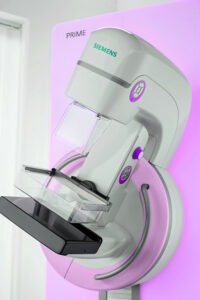 Breast Exams and Breast Health
Breast Exams and Breast Health
With the latest wide-angle 3D imaging capabilities at Glacial Ridge Hospital, breast cancer has nowhere to hide. The newest mammography system from Siemens was designed with you in mind, and it provides unparalleled early detection. That means higher diagnostic accuracy in detecting early breast cancer versus standard 2D technology and clearer imaging, resulting in fewer callbacks for a second look. To schedule a screening in Glenwood, call 320.634.2273.
New in August 2024: GRHS now offers mammograms for women with breast implants! In addition to early detection of breast cancer, mammograms can also help identify issues with implants, such as leakage or rupture.
Benefits of Breast Exams with 3D Mammography
- A more inviting exam and increased comfort
- The lowest radiation dose possible – with uncompromised image quality
- Tailored exams with individual dosing needs
- Wide-angle at 50 degrees
For your next screening or diagnostic mammogram, with optimal comfort and image clarity, choose 3D Mammography at Glacial Ridge Health System. Schedule your next annual well-woman exam and mammogram on the same day for your convenience.
Screening Guidelines for Breast Health
Who should have a mammogram? The American Congress of Obstetricians and Gynecologists, American College of Radiology, and Society of Breast Imaging recommend that women at average risk start getting annual mammograms at age 40. Since there are many risk factors, women are encouraged to have discussions with their doctor to make a shared decision regarding what age to begin screenings and how frequently to have them as they age. Mammograms for women with breast implants follow the same guidelines as women without breast implants.
For women at risk for breast cancer, our breast health experts encourage following these breast cancer screening recommendations:
- Breast self-awareness
- Clinical breast exam
- Mammography
- Advanced diagnosis
Breast Imaging
A routine breast health evaluation should include imaging. Breast imaging is an important part of diagnosing breast cancer. Here are the three major types of imaging:
- Mammography – 2D and 3D
- Ultrasonography
- Breast MRI
- Performing an MRI can determine the extent, size, and distribution of recently diagnosed breast cancer. A Breast MRI can also be used to screen women at high risk of developing breast cancer or for women who had a mammogram that was unclear. (Not all hospitals have Breast MRI capabilities. When needed, GRHS patients are referred to a hospital that does Breast MRIs.)
Breast Biopsy
Following imaging, suspected breast disease can be confirmed by performing a tissue biopsy. Our surgeons expertly perform breast-conserving surgery for patients at GRHS. Their goal is to catch the disease in its early stages to increase the chances of survival.
A sentinel lymph node biopsy is a surgery that takes out lymph node tissue to look for cancer. A sentinel node biopsy is used to see if known cancer has spread from the original cancer site. A sentinel node biopsy may be done instead of a more extensive surgery called lymph node dissection.
Early Detection is Vitally Important
Studies have shown that, when detected early, the chance for successful treatment of breast cancer is nearly 100%. Methods for early detection of breast cancer include clinical breast examinations, self-examinations, and screening mammograms. A screening mammogram can identify an abnormal breast mass as early as two years before it can be detected by clinical or self-examinations.
Breast Density and Screening
Why is breast density important, and how do you know if you have dense breast tissue? Please talk to your doctor. They will be able to tell you if you do from past mammograms. Together, you can decide which, if any, additional screening exams are right for you. For more information about breast density, read What is breast density and why does it matter?
Minnesota’s Sage Screening Program can help women with cost.
Sage Screening Programs helps low-income Minnesotans or those who do not have adequate insurance to access breast and cervical cancer screening, diagnostic services (if screening tests are abnormal) and referral to treatment services! Call 651.201.5600 to see if you qualify or ask any of our clinic receptionists or radiology techs for more information.
